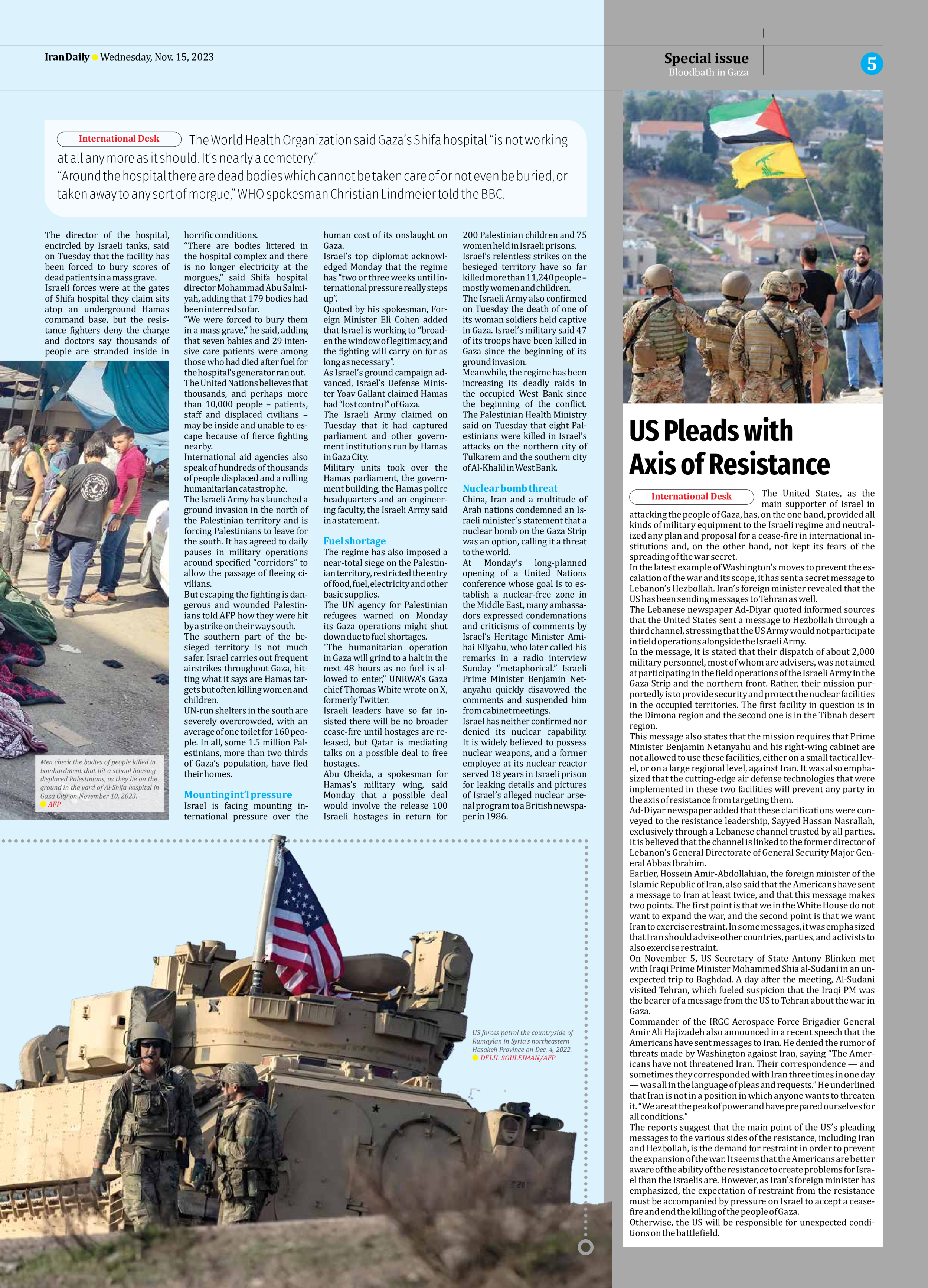
WHO: Gaza’s Shifa hospital ‘nearly a cemetery’
The director of the hospital, encircled by Israeli tanks, said on Tuesday that the facility has been forced to bury scores of dead patients in a mass grave.
Israeli forces were at the gates of Shifa hospital they claim sits atop an underground Hamas command base, but the resistance fighters deny the charge and doctors say thousands of people are stranded inside in horrific conditions.
“There are bodies littered in the hospital complex and there is no longer electricity at the morgues,” said Shifa hospital director Mohammad Abu Salmiyah, adding that 179 bodies had been interred so far.
“We were forced to bury them in a mass grave,” he said, adding that seven babies and 29 intensive care patients were among those who had died after fuel for the hospital’s generator ran out.
The United Nations believes that thousands, and perhaps more than 10,000 people – patients, staff and displaced civilians – may be inside and unable to escape because of fierce fighting nearby.
International aid agencies also speak of hundreds of thousands of people displaced and a rolling humanitarian catastrophe.
The Israeli Army has launched a ground invasion in the north of the Palestinian territory and is forcing Palestinians to leave for the south. It has agreed to daily pauses in military operations around specified “corridors” to allow the passage of fleeing civilians.
But escaping the fighting is dangerous and wounded Palestinians told AFP how they were hit by a strike on their way south.
The southern part of the besieged territory is not much safer. Israel carries out frequent airstrikes throughout Gaza, hitting what it says are Hamas targets but often killing women and children.
UN-run shelters in the south are severely overcrowded, with an average of one toilet for 160 people. In all, some 1.5 million Palestinians, more than two thirds of Gaza’s population, have fled their homes.
Mounting int’l pressure
Israel is facing mounting international pressure over the human cost of its onslaught on Gaza.
Israel’s top diplomat acknowledged Monday that the regime has “two or three weeks until international pressure really steps up”.
Quoted by his spokesman, Foreign Minister Eli Cohen added that Israel is working to “broaden the window of legitimacy, and the fighting will carry on for as long as necessary”.
As Israel’s ground campaign advanced, Israel’s Defense Minister Yoav Gallant claimed Hamas had “lost control” of Gaza.
The Israeli Army claimed on Tuesday that it had captured parliament and other government institutions run by Hamas in Gaza City.
Military units took over the Hamas parliament, the government building, the Hamas police headquarters and an engineering faculty, the Israeli Army said in a statement.
Fuel shortage
The regime has also imposed a near-total siege on the Palestinian territory, restricted the entry of food, fuel, electricity and other basic supplies.
The UN agency for Palestinian refugees warned on Monday its Gaza operations might shut down due to fuel shortages.
“The humanitarian operation in Gaza will grind to a halt in the next 48 hours as no fuel is allowed to enter,” UNRWA’s Gaza chief Thomas White wrote on X, formerly Twitter.
Israeli leaders have so far insisted there will be no broader cease-fire until hostages are released, but Qatar is mediating talks on a possible deal to free hostages.
Abu Obeida, a spokesman for Hamas’s military wing, said Monday that a possible deal would involve the release 100 Israeli hostages in return for 200 Palestinian children and 75 women held in Israeli prisons.
Israel’s relentless strikes on the besieged territory have so far killed more than 11,240 people – mostly women and children.
The Israeli Army also confirmed on Tuesday the death of one of its woman soldiers held captive in Gaza. Israel’s military said 47 of its troops have been killed in Gaza since the beginning of its ground invasion.
Meanwhile, the regime has been increasing its deadly raids in the occupied West Bank since the beginning of the conflict. The Palestinian Health Ministry said on Tuesday that eight Palestinians were killed in Israel’s attacks on the northern city of Tulkarem and the southern city of Al-Khalil in West Bank.
Nuclear bomb threat
China, Iran and a multitude of Arab nations condemned an Israeli minister’s statement that a nuclear bomb on the Gaza Strip was an option, calling it a threat to the world.
At Monday’s long-planned opening of a United Nations conference whose goal is to establish a nuclear-free zone in the Middle East, many ambassadors expressed condemnations and criticisms of comments by Israel’s Heritage Minister Amihai Eliyahu, who later called his remarks in a radio interview Sunday “metaphorical.” Israeli Prime Minister Benjamin Netanyahu quickly disavowed the comments and suspended him from cabinet meetings.
Israel has neither confirmed nor denied its nuclear capability. It is widely believed to possess nuclear weapons, and a former employee at its nuclear reactor served 18 years in Israeli prison for leaking details and pictures of Israel’s alleged nuclear arsenal program to a British newspaper in 1986.
The World Health Organization said Gaza’s Shifa hospital “is not working at all any more as it should. It’s nearly a cemetery.”
“Around the hospital there are dead bodies which cannot be taken care of or not even be buried, or taken away to any sort of morgue,” WHO spokesman Christian Lindmeier told the BBC.







